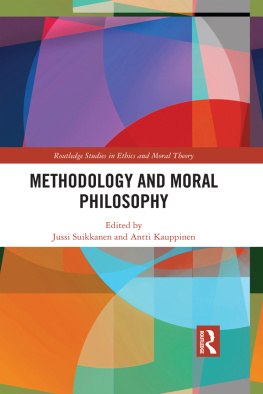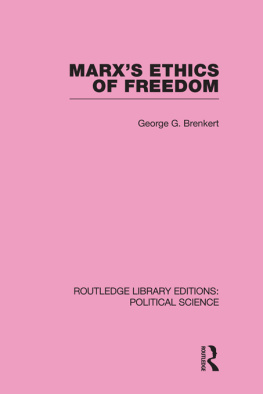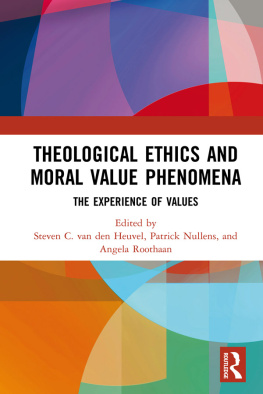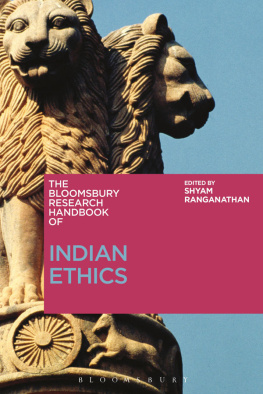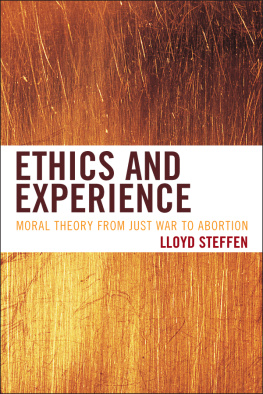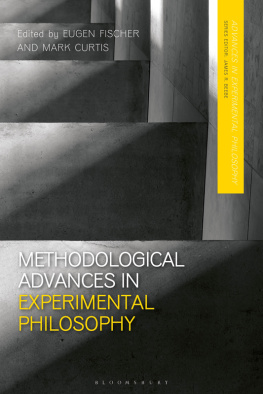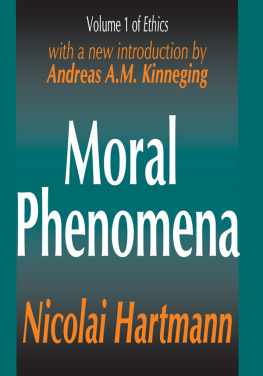The editors and publisher are grateful for permission to reproduce copyrighted material: is reprinted with the permission of Oxford University Press and Alex Wiegmann, Joachim Horvath and Karina Meyer. The figure appears in their article Intuitive Expertise and Irrelevant Options ( Oxford Studies in Experimental Philosophy , Tania Lombrozo, Joshua Knobe and Shaun Nichols (eds.), forthcoming).
Background
I often come across two different but equally perplexing attitudes towards methodological questions in moral philosophy. Firstly, many think that, as a discipline, moral philosophy has a unique method, comparable in significance to the experimental method of the natural sciences. This well-known reflective equilibrium method was first explicitly outlined by John Rawls (1951, 1971, 1974). Many ethicists appear to think that knowing the basics of how the reflective equilibrium method works is all you need to know about how moral philosophy should be done.
The reflective equilibrium method is easy to outline. We must begin from judgements about individual cases which must be held sincerely and which must also be stable in the kind of careful deliberation that is not distorted by strong emotions or self-interested bias. In the second stage, we attempt to formulate a set of general moral principles that could both fit and also justify the previous convictions. When we formulate these principles at this preliminary stage, it will be likely that there will not be a perfect match between our carefully considered judgements about the cases and the general principles.
In the third stage, we then try to get rid of the previous conflicts in two ways. In some conflict cases, it makes sense for us to modify our judgements about the cases on the basis of the general principles because those principles support our intuitions so well elsewhere. In other cases, in contrast, it makes more sense to attempt to find new, more sophisticated principles so that we do not have to give up our convictions about the cases given how deeply held they are.
Finally, in the fourth stage, we fine-tune our principles by taking into consideration the leading ethical theories on the topic and the best arguments made in their support. We are also to seek wider reflective equilibrium by broadening the set of moral and non-moral beliefs with which the relevant moral principles we have formulated are supposed to be compatible. Thus, at this final stage, we check that the latter principles are compatible also with what we know, for example, about what kind of social systems can be stable and what influences our moral judgements.
It is easy to see just why the reflective equilibrium is such a promising account of how we ought to do moral philosophy. It is an ideal that seems to provide us with almost something like an algorithmclear steps which anyone should be able to follow systemically in order to achieve moral knowledge. The description of the method also intuitively seems to capture something about how many moral philosophers themselves understand what they are doing. It is thus not surprising that the majority of moral philosophers continue to endorse the method at least in some form.
Despite this, many ethicists have always been torn about the reflective equilibrium method for several reasons. Firstly, there have always been many forceful objections to the method. One of the most poignant criticisms has always been that, even if when we use the reflective equilibrium method we must begin from our carefully considered moral judgements, these judgements are still bound to be a reflection of cultural indoctrination, superstition and bias (Hare 1975; Brandt 1979, pp. 212). As a consequence, whatever moral principles end up being in a reflective equilibrium with our carefully considered judgements, these principles will be just as unlikely to reflect the moral reality as the intuitions that serve as the input, or so the objection goes.
Even if this objection seems to have considerable force, it has not been able to change that many peoples minds about the reflective equilibrium method. This is because, if we are not allowed to rely on our carefully considered judgements in the evaluation of moral principles, then we would be required to evaluate those principles from a completely non-moral, non-evaluative point of view. Yet, in this situation, it becomes less clear on what grounds we could be able to choose between alternative moral principles (Hooker 2000, p. 11). As Frank Jackson (1998, p. 135) put it, we must start from somewhere in current folk morality, otherwise we start from somewhere unintuitive , and that can hardly be a good place to start.
The reflective equilibrium method also suffers from other problemstwo of which are relevant here. Firstly, many ethicists feel like the description of the reflective equilibrium method is not especially helpful when it comes to their everyday work. Somewhat boringly, the method merely guides us vaguely to seek coherence between our carefully considered moral convictions, moral principles and the relevant empirical beliefs. Yet, very few people have thought that incoherent views are better than coherent ones, and more importantly the reflective equilibrium method does not tell us exactly how we should make our principles cohere with our carefully considered convictions. In any given conflict situation, is it better to give up your carefully considered conviction or reformulate the general principles? The method itself does not tell, and therefore, when we make these choices, we must rely on our judgement. Yet, nothing in the description of the method helps us to avoid making mistaken judgements.
The second issue is that very few recent works in moral philosophy employ the reflective equilibrium method in any recognisable and explicit form. One reason for this is that many ethicists work on questions that simply cannot be answered by using it. If you work in normative ethics and are searching for general principles that capture what kind of actions are right and wrong across different contexts, then at least in principle you can rely on the method. Yet, if you happen to be working on any of the other equally interesting and important questions in normative ethics or if you are trying to solve problems in either metaethics or applied ethics, then there just does not seem to be any straightforward way in which you could rely on the reflective equilibrium method. For example, in meta-ethics finding a reflective equilibrium between our moral principles and carefully considered convictions about cases will tell us little about the meaning of moral concepts, the nature of moral judgements or the essence of moral properties. Likewise, in applied ethics, it is equally unlikely that the previous type of coherence between convictions and general principles could shed much light on which morally salient considerations should be taken into account when we consider the most difficult moral questions concerning climate change, war, new biomedical technology and so on.
Perhaps these limitations of the reflective equilibrium method have led to another extreme in the ethicists attitudes towards the methodological questions. The second common methodological attitude is a reflection of Paul Feyerabends (1975) anything goes view in the debates concerning the appropriate methods of science. The core idea behind this attitude is the observation that, if we consider both historical and more recent key contributions to moral philosophy, it is difficult to extract a unique method such that its use would explain the fact that these very contributions constitute the most important advances. Rather, what we seem to find from the key works of moral philosophy is very different kinds of arguments, and so, in a sense, the biggest advances have been made by using very different kinds of methods. As a consequence, it just is not plausible that any strict methodological rules would have governed the growth of knowledge in moral philosophy any more than in the case of natural sciences. Furthermore, those who have this liberal methodological attitude emphasise that, given that we do not yet know how the new advances will be made in the future, we should not require all ethicists to follow any strict methodological rules. After all, doing so would only prevent us from making important discoveries, the making of which will also require inventing new methods. We should thus let different ethicists pursue different lines of inquiry as they see fit and just see what works, or so the argument goes.

